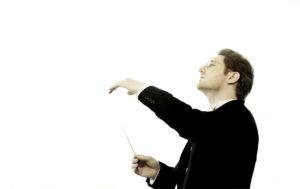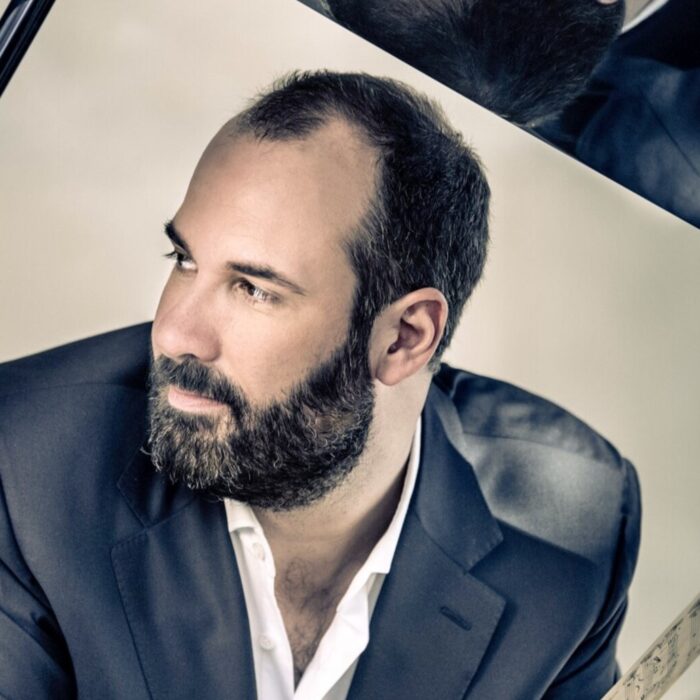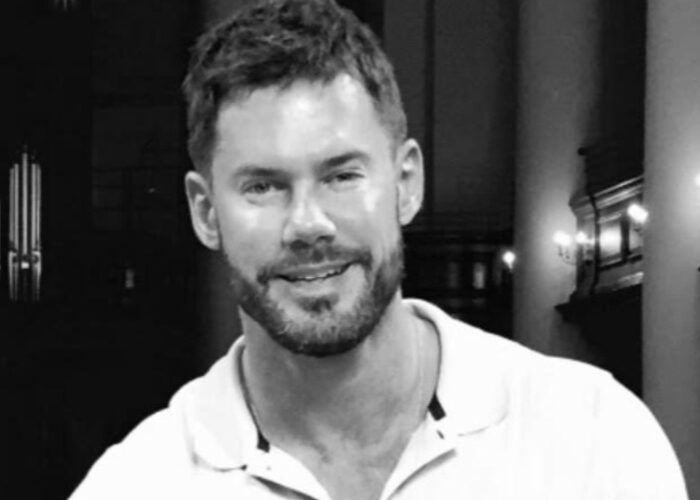
Q & A: Ramon Tebar On Creating An Academy With Renata Scotto & Balancing Four Different Companies
By Francisco SalazarRamon Tebar is an up-and-coming conductor who has worked with some of the most acclaimed artists in the classical music world including Roberto Alagna, Joshua Bell, Montserrat Caballe, Joseph Calleja, Gautier Capucon, Plácido Domingo, Angela Gheorghiu, Maria Guleghina, Ben Heppner and Renata Scotto. Aside from his work with these legendary artists Tebar keeps a hectic schedule as he is the Artistic and Music Director of the Palm Beach Symphony, the Artistic Director of OperaNaples, the Principal Conductor of the Florida Grand Opera and the Principal Guest Conductor of the Palau de les Arts, Reina Sofia.
OperaWire spoke to the conductor about his current projects and challenges of balancing and juggling so many different positions with these companies.
OperaWire: You currently hold positions with four different companies. As the artistic director of Opera Naples, music director of Palm Beach Symphony, principal conductor of Florida Grand Opera and principal Guest Conductor at the Palau de Les Arts, how do you balance so many responsibilities?
Ramon Tebar: It is not easy, but with very good planning it is possible. Florida’s season is shorter than in other places, therefore I try to focus most of the events during the high season months in that part of the US and after I have 8 months to plan in different places around the world like in Valencia and in all the places where I conduct as a guest.
OW: What are the major challenges?
RT: The main challenge is to balance the time. Opera is always a bigger challenge because of the different forces into play. More rehearsal time, orchestra, choruses, soloists, dancers, staging, lighting, stage directors, etc… A symphonic concert requires from three to four days to a week of a conductor’s time at the most. In opera, half of the artists are moving on stage, the other ones in the pit in a different level, and there are lighting and scenery changes. For a symphonic concert everyone is still, behind their music stands looking at you. That’s a different kind of difficulty. Opera is by far the greatest school, not only for conductors, but for orchestra musicians, singers, choruses, etc… There is so much to learn in the opera house. Like the great Carlos Kleiber said, “Symphonic music can wait. Opera means technique in the broad sense of the word, and with a good technique you can forget technique.” That’s how important opera is for a conductor.
OW: You’re the guest Guest Conductor at the Palau de Les Arts and you’re currently conducting “La Traviata” with Plácido Domingo, Arturo Chacón Cruz and Marina Rebeka in a new production by Sofia Coppola. Can you tell me about the experience of working with such an all-star cast and what have you learned from them?
RT: Yes, this is my third opera in my new theater in Valencia, and I am very grateful to Davide Livermore, the Artistic Director at Les Arts for having trusted me to conduct this wonderful production which is one of the highlights of the season. I have already worked with Plácido Domingo and Arturo Chacón in the past, but it is my first time with Marina Rebeka. This is a cast of really top artists. Marina Rebeka is a wonderful soprano with a beautiful color and great musicality. She has done the role of Violetta more than 150 times, so she has it deep inside.
It has been a wonderful discovery for me to make music with her for the first time. With Arturo I have worked in the past in Cincinnati Opera and at the Florida Grand Opera where we did Puccini’s “La Bohème” to a great acclaim. He is one of those singers who knows his part very well and on stage he is always with the conductor, no wonder why Domingo likes to work with him as a partner in so many productions. And with Plácido, there is little that I could add to what everyone knows about him. He is one of the great artists in opera history. The first time we worked together was six years ago. He is not only one of the best singers ever, but a great actor and a marvelous musician. His way of phrasing, of saying the text and coloring the words makes his art very special. It is always a big pleasure to make music with him.
OW: After your performances at the Palau you return to Opera Naples for a set of performances. Can you tell me about programming the season at this house and the kinds of things that are considered?
RT: We definitely try to balance traditional with out-of-the box repertoire, combining local talent with international names. In my three seasons as Artistic Director some of the operas we have programmed are “Maria de Buenos Aires” by Piazzolla, “Tango” by Xavier Robert Rodriguez, “The Four Note Opera” by Tom Johnson and “The Rappacini’s Daughter” by Daniel Catan. We have brought international names such as Gregory Kunde, John Osborn, Thiago Arancam, Angela Meade, Marcy Stonikas and we have created an opera academy with Renata Scotto. Of course, we have not forgotten the traditional repertory like “Boheme,” “Turandot,” “Don Pasquale,” “Die Fledermaus,” “Die Zauberflöte,” which should be a given in every theater. We present from fully staged operas to chamber operas, chamber music, lyric concerts, recitals, lied and teaching. I want to integrate everything.
OW: Tell us a little about the program you created with Renata Scotto. What the plans for the future and what was the thought process behind the program created?
RT: I think that passing our experience to the next generation should be part of our commitment as artists. Opera Naples gave me the conditions to create a proper academy, besides the young artist program that we already have. Of course, I wanted to do it with one of the greatest, and since I have known Renata Scotto for years, I proposed it to her and she believed in this project enthusiastically.
It is an honor to have someone like her who has made history in the opera world but who at the same time is not only a good singer, but a fantastic actress, a stage director and a consummate musician. I don’t believe in the typical masterclass, a short visit for a couple of days where the teacher doesn’t have enough time to spend with the students, and the students don’t have the time to absorb and learn properly. Most of the time a masterclass becomes more a show for the audience than the real thing, which is the purpose of having a master to teach: having the proper time to follow the improvement of the students, asking them to learn new repertoire. This is impossible to do in one or two days. Therefore, we decided to do an academy which would go in the first edition from January to March, with longer periods of time where the students can have many lessons with Renata and the various coaches. Since we want to share this experience with the public, we have what I like to call ‘encounters’ or ‘evenings’ with Renata Scotto. This is more than just a masterclass. The first one, called “An evening with Renata Scotto”, was a wonderful evening in which I hosted a 45 minute conversation with Renata about her life, career, music, which included video projections of Renata’s performances. At the end she taught three students in interaction with the audience who were allowed to ask questions to Renata. At the end of each period, there will always be a final concert in which all the students participate and show their work during their time with her.
OW: Do you plan on bringing any other artists to do programs like these?
RT: The idea was born with Renata Scotto in mind as the main teacher of the academy. After the huge success we have had, and with more applications than we can accept from all over the world, Renata and I intend to continue it as we have started it, but we are already speaking about expanding the time in order to be able to accept more students! Of course, guest artists are considered in order to enrich the experience, and we have brought coaches from Italy and Russia with whom Renata has worked in the past and trusts very much. Another wonderful collaboration for this first edition has been with the Teatro de la Zarzuela in Madrid, offering the opportunity to singers that are currently singing professionally in its season. Also, the Spanish government, through Spanish Cultural Action, awarded us with the highest grant amount that they give to help us give out scholarships in order to cover international flights and housing close to the theater for the students. Even a Korean company has collaborated in order to sponsor students and of course, several local sponsors. In our first period that we just finished last week, we have had students from USA, Canada, Mexico, to Spain, Italy and even China.
OW: Being so involved in the opera world in Florida, what are the challenges of growing opera and cultural awareness? What are some surprises that you have found in the community regarding its relationship to the art form?
RT: For our company in particular, the main challenge is the lack of a permanent home in which we can present opera during the dates in the season as we wish. Of course, we have the Wang Opera Center, which is ideal for rehearsals, recitals, Chamber opera, and our Renata Scotto Opera Academy, but we need a theater where we can present fully staged productions during high season with the proper technical rehearsal time to present the quality we want.
The community at large needs its own opera theater, and we are currently working to make that happen. We are now presenting our full-scale productions at Artis-Naples, and the response and attendance of the audience has been very warm and generous. My experience with the community has been a pleasant surprise as we have had excellent attendance for all of our concerts and operas, as well as some sold-out events. It seems to me that people here are expecting high quality and varied artistic performances, and that’s what I always want to offer to my audiences. I feel as if we are fulfilling that by offering a wide range of creative programming. It’s important to feature traditional artistic offerings as well as present new and innovative ideas. By doing this, we build audience and generate interest in different facets of the art form. We are also very grateful for the very encouraging reviews and positive publicity that the press has been giving us. After ten years of building and growing, Opera Naples is taking all the right steps in moving forward to put itself on the map of the international opera scene.
OW: At the end of the season you’re conducting “Marina” at the Teatro de la Zarzuela. This is an opera but it is being done at a theater that generally shows zarzuela. Having conducted zarzuela before, what are some of the challenges of conducting that genre that are not present in opera?
RT: Being a Spaniard, many would think [that I have conducted a lot of zarzuela], but strange enough, I have never conducted a whole Zarzuela in my life. Although this year I will make my debut at Teatro de la Zarzuela in Madrid, I will conduct “Marina,” which is not a zarzuela but Spanish opera. Yet, I love zarzuela and I used to play a lot in concert when I was very young. With orchestra I have conducted preludes, intermezzi, romanzas and duos in parts of concerts, for example with Montserrat Caballé, Plácido Domingo, Joseph Calleja and everywhere the zarzuela has always been received with huge success.
Some singers find it challenging to go from the singing to the dialogue and back, which is one of the main characteristics of the genre. Other than that, a singer who sings opera and then goes to sing zarzuela doesn’t have to change technically his way of singing, as it needs the same kind of projection that they use in opera. It is exactly like singing Mozart’s “Le Nozze di Figaro” and “Die Zauberflöte” (which, as a singspiel, has dialogue like the zarzuela).
OW: You have brought zarzuela to Opera Naples, how has the public responded to it?
RT: In my experience doing zarzuela abroad, I didn’t have any doubt that audiences would love this music in Naples, so I was not surprised that the zarzuela concert we did for the first time last year was one of most successful performances we have presented at Opera Naples. It was a sold-out concert and we even had a waiting list for tickets. Therefore, I thought we should do another one this season with the same results. Sold out again. This time we brought six singers directly from Spain. Most of them are singing at Teatro de la Zarzuela in Madrid this current season, so they know the style very well and I think the public was able to appreciate it.
OW: How to do you think we can expose the art form to American audiences?
RT: For me the best way to expose Zarzuela to an American audiences is doing it well, bringing quality singers and performers who know the style. Nothing different from what you would expect when you do Italian, French or German opera. It doesn’t mean that zarzuela can only be sung by Spaniards. On the contrary!. It would be as stupid as to think that German, Italian, French or Russian can only be done respectively by Germans, Italians, Frenchmen or Russians. Fortunately, the opera world has and has had great performers of all nationalities who perform opera in different languages, even if they are not native to any of them. For example, Maria Callas was Greek singer born in America.
For me, it would be a dream that one day some zarzuelas are included in the international repertoire and are learned by all kinds of singers. We just need better marketing, as I am convinced of the high quality of many of them. Although zarzuela is regarded as the Spanish operetta, in a pejorative way, there are some zarzuela that are at the level of the best operettas and even some at the same musical level of some operas already in the repertoire.


